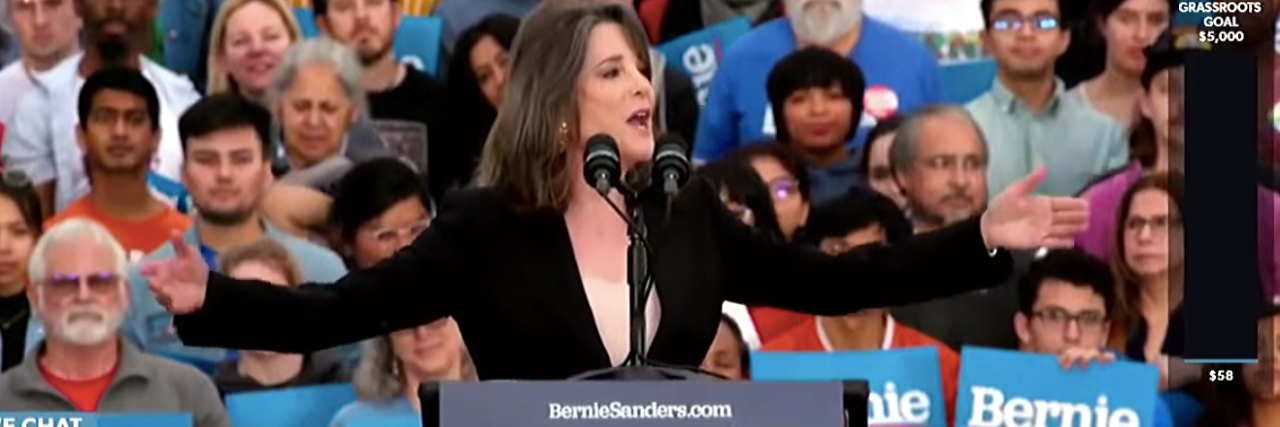Marianne Williamson's Endorsement of Bernie Sanders Doesn't Cancel Out His Disability Policy
Editor's Note
This story reflects an individual’s experience and is not an endorsement from The Mighty. We believe in sharing a variety of perspectives from our community.
Judging by commentary on Twitter, a segment of the disability community is outraged by Bernie Sanders’ embrace of Marianne Williamson, who recently appeared with him in Austin, Texas, after she endorsed him for the presidency. As Kendall Brown of Bitch Media rightly points out, the self-help guru subscribes to a certain “individualistic spiritual ideology that has always preached that solutions to one’s problems are found within.” The end result is that disability policy is seen not as a matter of systemic change, but as about one’s personal relationship to one’s own body.
It is only in this vein that we can make sense of Williamson’s claim that depression is a “spiritual disease,” not a real condition, as well as her 2010 “A Course in Weight Loss” assertion that men with AIDS could cure themselves by forgiving their enemies. Critics are correct to point out that from mental health to minimum wage — she visited a sheltered workshop to commemorate the anniversary of the Americans With Disabilities Act — Marianne Williamson is out of step with our community.
That being said, I believe Bernie Sanders has the most progressive disability policy of anyone in the presidential race, and he needs Marianne Williamson’s supporters to aid in propelling him to the nomination. Sanders is the only candidate who has promised that as president he will ensure disabled people who are unable to work will live above the poverty line. Both as a senator and a presidential candidate, he has contended that long-term supports and services will be covered under Medicare for All. Equally important, under his administration, the marriage penalty will be abolished once and for all. The Sanders proposal is so comprehensive that it meaningfully tackles our civil rights, healthcare, criminal justice, social security, education, jobs and wages, and transportation and emergency preparedness, among other disability justice issues.
While I am no fan of the self-help guru or her ideology, 2.7 million people follow Marianne Williamson on Twitter, and over 800,000 people like her on Facebook. These are not insignificant numbers of people, enough to throw Sanders over the top in his quest to secure the nomination and eventually the White House. Expecting ideological purity from any viable contender for the nation’s highest office is an unfair requirement for any candidate, especially one who has demonstrated steadfast dedication to disabled people and disability representation.
The reality is that the Vermont senator has welcomed a number of disability policy experts in helping him devise actionable plans that will revolutionize disability rights in America, and there is no sign that anything will change with Williamson’s endorsement. Our representation is so important to Sanders that he has vowed to appoint a disabled person to be Senior Advisor on Disability Policy on the White House Domestic Policy Council. Such representation is monumental for the disability community, and for civil rights in general. Convincing Marianne Williamson’s supporters of the rightness of Sanders — followers who may or may not agree with her on disability policy to begin with — only helps Sanders in his bid for the presidency, and ultimately in achieving the aims of disability justice and representation.
Embracing Williamson changes nothing about any of Senator Sanders’ disability plans or his commitment to our community. After all, touting an endorsement is not the same in degree or in kind as appointing Williamson to any kind of policy role on his team or in his administration, and there is no evidence that he will do so. The only thing having her speak at his rally signals is that Sanders will have a big tent, as he seeks to be on the world’s largest stage to enact his groundbreaking policies.
I believe the row over Sanders and Williamson appearing together at a rally is a symptom of callout culture, where someone who is not 100 percent pure — a standard no public figure nor plebeian can attain — is publicly excoriated and “canceled.” The same thing happened to fellow Democratic candidate and former Vice President Joe Biden when he incomprehensibly contended that stuttering was the only disability it is still permissible to mock and when he patted a disabled activist on the head. Sanders has shown no evidence of Biden’s faux pas, yet there are activists who would jettison everything beneficial about the Vermont senator’s policies, simply because he needs a large swath of support to win the Presidency. While no one is immune to criticism, I think Sanders’ policy is more important than this one incident.
While no one agrees with every move a given presidential candidate makes, we must not lose sight of the ultimate goal, which is systemic justice for disabled people and the betterment of the lives of those in our community. When measured against such yardsticks, Bernie Sanders’ embrace of Marianne Williamson is worlds less important than the measurable policies he will exact as president. Since Williamson is not being welcomed as a campaign policy adviser, her past statements about disability policy do not detract from his laudable goals. Instead of spreading anti-Sanders screeds on social media, I would implore those of us who are concerned with disability justice to become involved in a campaign that will make revolutionary change for disabled people.

